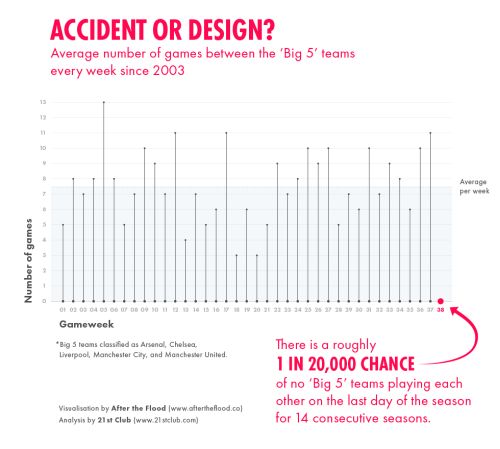By Daniel Geey, Adam Lovatt and Omar Chaudhuri.
Introduction
During an early morning coffee between two of the three authors of this blog (Daniel and Adam), Adam came up with a particularly interesting statement; he couldn't remember the last time the opening game of a Premier League season involved two top 5 teams playing each other. With the 2016/17 fixture list released fresh in the knowledge that Liverpool were to play Arsenal, it got both authors thinking about the relative quirks of what must be a complicated Premier League fixture algorithm. After a fleeting Google search, we realised that prior to this current season, 2010 was the last game involving a top five club (classed as Manchester City, Manchester United, Arsenal, Chelsea and Liverpool) which involved Joe Cole getting sent-off on his Liverpool debut v Arsenal.
As lawyers, we quickly realised we had neither the easily accessible data, excel ingenuity or first clue about how to collate fixture list information to prove or disprove our 'theory'. Enter stage left, Omar from the excellent football consultancy 21st Club (aka the brains behind the operation).
We did our best to articulate to Omar whether he could shed any light onto particular Premier League fixture quirks. Omar did his thing and provided us with the below chart from 2003-2004 season onwards providing 14 years of fixture data. As luck would have it, the authors' gut feel was a little off (but we can explain why later).

Analysis
The real intrigue related to the final fixture of the season. On average there have been 7.4 top 5 games in each game week over the 14 seasons. As you can see, not a single top 5 game has been played which was rather unexpected. The probability of having 14 consecutive final days without a top 5 match is 0.005% or around a 1 in 20,000 chance. Now it may be that the Premier League has good reason not to schedule a top 5 game that may in effect become a title decider or alternatively it may be a completely random occurrence.
From various internet searches, the authors found no reference as to why a top 5 game has never been played on the final day since 2003 when Chelsea played Liverpool or whether the Premier League ensures that such a match cannot be played by factoring this into their fixture algorithm. This is a significant outlier bearing in mind the two other lowest match day fixture positions (match days 18 and 20 both in December) contained at least 3 such games.
Importantly, this anomaly does impact on non-top 5 clubs as presumably they are more likely to face a top 5 club in the final game of the season if those clubs can't/don't face each other. Although clubs battling relegation are more likely to play a top 5 team, there isn't a strict disadvantage as they would all have equal chance of playing a top 5 team. However it still reduces the possibility of a positive result for relegation threatened teams (given the difference in quality between the sides), which in turn possibly reduces the attractiveness of the competition because the outcome may be more predictable.
The authors are aware that what may have been a top 5 game in 2003 is not the same as a game 6 years ago and is certainly not the same as last season's Premier League finishing. For example, two of the games classified as top five games in the first game week probably wouldn't have been classed as such given the context. The first is Chelsea v Liverpool in 2003 (at the start of the Abramovich era) and the second is Chelsea v Manchester City in 2006 with Sven-Göran Eriksson appointed as manager during that season before City's subsequent takeover and
Interestingly, there has been at least one top 5 match in gameweek 5 for the tenth season in a row.
Conclusion
In any event, game week 5 along with game weeks 12, 17 and 37 are the prime spots over the season. It will be fascinating to see whether any top 5 fixtures appear in those game weeks again next season and intriguingly whether a top 5 game occurs during the final set of fixtures during the 2017-18 Premier League season.
www.danielgeey.com
www.twitter.com/FootballLaw
The content of this article is intended to provide a general guide to the subject matter. Specialist advice should be sought about your specific circumstances.


